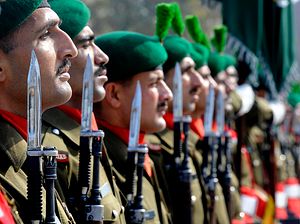Pakistan’s southern province of Balochistan is widely projected to become a regional trade hub on account of the Chinese-funded China-Pakistan Economic Corridor (CPEC). If this grand connectivity corridor materializes as planned, this will undoubtedly make developing Pakistan into a major economic and naval power in South Asia.
However, the growing presence of the Islamic State (ISIS) in Balochistan is highly likely to further complicate the insurgency landscape of the resource-rich province, thus posing major security impediments to the economic projects under CPEC.
ISIS has recently ramped up its furtive efforts to establish a permanent foothold in restive parts of Balochistan. The militant outfit claimed that its fighters killed two Chinese language teachers who were kidnapped on May 24 in Quetta, the terror-stricken provincial capital of Balochistan. Indisputably, this is a threatening development that could well bring ISIS quite close to assorted Baloch insurgent groups that are also bent upon targeting Chinese nationals in the province with the intent to block CPEC.
The Islamic State’s increasing presence in Balochistan has lately pressed the army into action to inhibit the militant group from cultivating roots in the insurgency-stricken areas of the province. The army recently conducted an intelligence-based military operation against the proscribed Lashkar-e-Jhangvi (LeJ) Al Alami, which was hiding in caves of Koh-i-Siah near Mastung. According to Inter-Services Public Relations, 12 hardcore militants were killed in the exchange of fire, which lasted for three days.
The outlawed group was believed to be making some attempts at communicating with ISIS in Iraq and Syria so as to establish the latter’s footholds in some parts of Balochistan. If the LeJ Al Alami’s budding headquarters had not been razed by the army, the militant group could have carried out some deadly attacks across the province.
Though the provincial government, led by the Pakistan Muslim League-Nawaz, has repeatedly denied the menacing presence of ISIS in Balochistan, the transregional militant outfit has so far claimed some grisly terrorist attacks in the province. ISIS claimed some of the major recent attacks in the province, including suicide attacks targeting lawyers in Quetta on August 8, 2016, the Quetta Police Training College on October 24, 2016, and the Shah Noorani shrine on November 12, 2016. ISIS has also claimed the Mustang attack on Senate Deputy Chairman Maulana Abdul Ghafoor Haideri in May this year.
ISIS has thus far failed to fully establish covert sanctuaries in Balochistan largely because of the military’s Operation Zarb-e-Azb and Operation Radd-ul-Fassad. After Saifullah Kurd, operational commander of LeJ in Balochistan, was made into the ISIS chief in the province, he was killed in a fierce gun battle in Quetta in February 2015.
The killing of ISIS operatives in Balochistan has made the militant group adopt the clever policy of secretly aligning with some like-minded and well-established local outfits with the view to augment its presence and relevance in the province. The potential recruitment bases and resources of some local groups such as the LeJ have immensely helped ISIS carry out a raft of deadly attacks in the province.
On account of the low-intensity insurgency in Balochistan, certain militant and sectarian outfits have found safe hotbeds in the province to carry out their terrorist and militant activities. The continued military operations have successfully confined Baloch insurgents to the rugged mountains of central parts of the province. But both the LeJ Al Alami and the Jaish ul-Adl have capitalized on the army’s engagement against ragtag insurgents to establish their sanctuaries in the northern and western areas of Balochistan.
The lack of local resources and recruits has compelled ISIS to partner with the Lashkar-e-Khorasan (LeK) — a militant-cum-sectarian group based in the western and southern areas of Balochistan — to target Hazaras and Zikris in the province. The LeK brutally killed six Zikris on August 28, 2014, when they were busy in their worship at Zikrkhana. The same group is also believed to have painted walls in Turbat with pro-ISIS messages in the recent past. Though the LeK has lately gone underground owing to the heavy presence of army personnel in Balochistan’s littoral areas, the outfit could resurface and restart targeting the Zikri community in coastal areas of the province any time in the future.
The second partner of ISIS in Balochistan is the hibernating LeJ Al-Alami. Both groups have jointly orchestrated some gruesome attacks in the province, including the one on the police cadets in Quetta. The LeJ Al Alami has informally aligned with ISIS, aiming to use the brand of the latter to attract more and more misguided jihadists and funds for carrying out attacks on the beleaguered Hazara community in restive parts of Balochistan. In return, this terror partnership has greatly helped ISIS to introduce its militant brand across the province.
Islamic State’s recent deadly attacks in Iran hint that the group may also align with the anti-Iranian Jaish ul-Adl, a splinter group of Jundullah based in western Balochistan. Given the latter’s penetration into Iran’s province of Sistan-Balochistan, this alignment will help ISIS organize deadly attacks deep inside Iran.
If the Islamic State is allowed to strike its roots in Balochistan, the group will probably unleash its terror activities in both Iran and Pakistan. It is time both countries evolved a comprehensive policy designed to jointly flush out the rampaging militant group once for all.
Ayaz Ahmed is an analyst of international affairs based in Karachi. He is also a columnist with The News International, Pakistan Observer, Global Age Magazine, Jahanghir World Times, and Defense Journal.

































